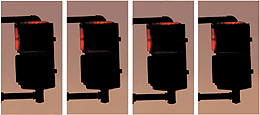When I was a kid there was a thing called the Iron Curtain. It divided Europe in two, and it stood for dictatorship, suppression and the denial of basic freedoms.

Now a modern equivalent is coming into being. It too stands for suppression and for the elimination of the liberty we once assumed was ours by right but which, perhaps, we took too much for granted. It will stand for dictatorship too if the people responsible for its creation think they can get away with it.
A curtain denies people the ability to see through it. It hides things. People on the outside cannot see in and those on the inside cannot see what is happening on the outside.
The people who established the Iron Curtain were determined to silence those with whose views they did not agree. They did this in two ways. For those inside the curtain, the authorities imposed draconian laws; they controlled newspapers and TV, they banned demonstration of opposition and they instilled fear in those who felt like speaking out. To silence those on the outside, it was simple; they just didn't let them in.
As a young man I recall viewing Eastern Europe from afar (and, for one week never forgotten, from the inside) with disdain. I hated the enforced silence of opinion. I despised the authorities for their imposition of ruthless border controls. We would hear stories that so-and-so had been denied entry or detained, or that another radio station had been jammed. For the inhabitants of East Germany, the Soviet Union and all the rest, the receipt of freely-expressed opinion was, in the eyes of their rulers, a luxury they could not afford.
And so, from the isolated Eastern Europeans of the 20th century, we come to the increasingly-suppressed Britons of the 21st. It is, truly, as if another curtain were descending, this time surrounding the island that once stood, bravely but horribly alone, as the free world's one remaining opponent of German Fascism. I shall call it the Brown Curtain, after the man who seeks to wrap his country in a cloak of silent suppression.
The silence, you see, is being imposed upon us. We on the inside are being denied the access to free opinion expressed on outside. Last week it was
Geert Wilders, a democratically elected European MP turned away from Britain's borders. Officially he posed a "threat to security". Translation: his visit would offend Muslims, and therefore could not be permitted.
And now, one week on,
it's happened again. This time it's two anti-gay campaigners who have been banned. Fred Phelps and his daughter Shirley Phelps-Roper belong to the
Westboro Baptist Church in the US. They were planning to visit the UK to protest against a performance of a youth play called
The Laramie Project, which recounts the death of a gay university student who was killed in Wyoming in 1998.
You have to say that these two are pretty much off the "freedom radar" themselves. They have been known to picket the funerals of US soldiers killed in Afghanistan because they think their deaths are God's punishment for America's tolerance of gays. Just as Wilders does, these people are fighting for illiberalism and suppression. But as with Wilders, that isn't the point.
It is characteristic of a liberal democracy that it allows the expression of views that run counter to the principles it is supposed to uphold. The foundations of freedom are strong enough that words alone cannot shift them.
Not so in Britain. Here the government does not like such views, so it bans those who wish to express them. The UK Border Agency is quoted as saying of our would-be visitors from America: "Both these individuals have engaged in unacceptable behaviour by inciting hatred against a number of communities". "Unacceptable behaviour". "Inciting hatred". These are the words not of those who seek to protect our liberty. It is the language of dictatorship.
The Brown Curtain encircles us. Next, it will smother us. Unless we stop it.








No comments:
Post a Comment